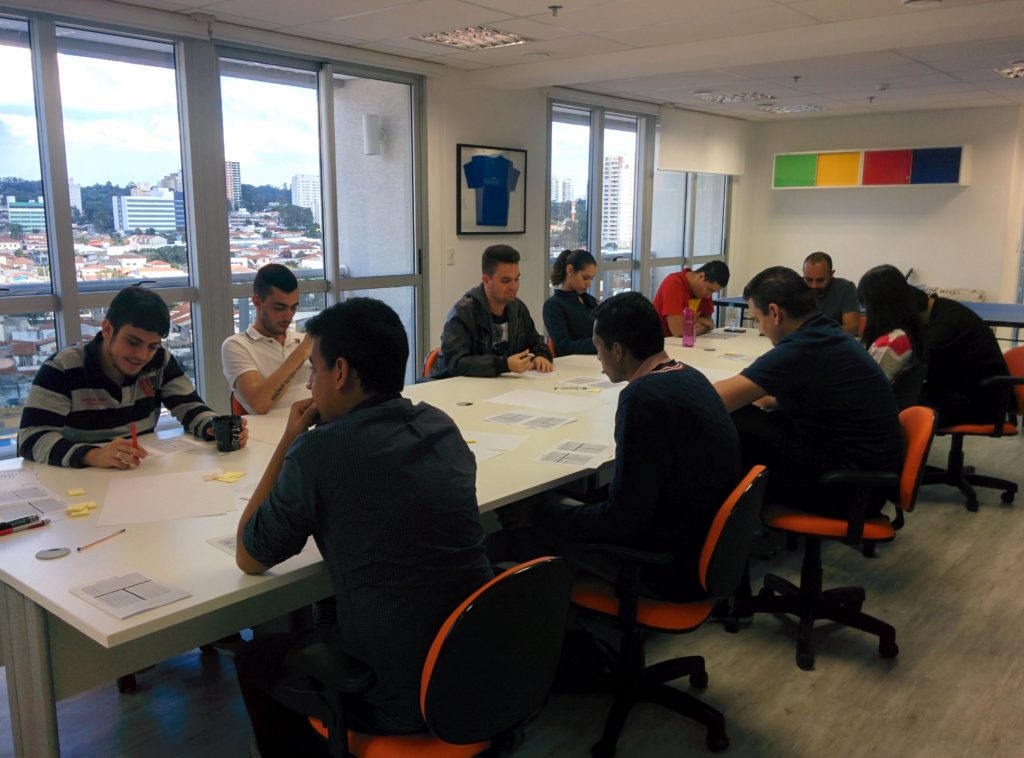by Thomas Kuryura
Here at Just Digital we created a new Management 3.0 experiment. We are an IT company that works with data management. We have grown from ten to 50 people in just the last couple of years, and, through it all, we’ve tried to keep the organization within an organic model. As the company has grown, some problems have surfaced. Our biggest challenges this year has been with job titles. Three major problems surfaced:
- Some collaborators have a clear goal in their minds, (ie, being a great developer) but at the same time they had problems creating a good plan on how to get there.
- Other more senior team members feel that they’ve learned enough from software development and expressed that they felt they should became a “Manager” or an “Architect,” based on big company paradigm of the “Career Plan Hierarchy Model.” We don’t agree to creating a hierarchy out of nowhere and we don’t want traditional management.
- The last problem we faced: some developers wanted to leave the development role, but for different reasons–they were not seeing opportunities to learn. They had their eyes on that invisible career ladder because market dictates that the Product Owner and Scrum Master roles pays better compensation. Our opinion here was clear: we don’t agree with horrible concept from past “Project Management.”
What now?
After a quick read on Management 3.0 Practices on Work Profiles and Salary Formula we got a lot of insights.
Redefining purpose of job titles
Our first step was to explain to collaborators that job titles and salaries are not the same thing. It is not imperative that a Scrum Master has more capacity to get better compensation plans than a Developer. More than a role, what dictates the collaborator’s salary is his reputation among his peers. Who gets better salaries in the company are known as the collaborators.
A collaborator can be trusted in a diversity of roles, to solve problems, to help peers, to innovate, to run experiments, to share knowledge and not to limit herself to her own job title or job role.
We explained this in a company-wide meeting.
‘Create Your Own Role’ workshops
The second and more important action was to create a small workshop, called: “Create your own role,” where any collaborator with her peers’ help can create her own informal job title. The workshop, in fact, was quite simple:
We have split the audience in small groups of four to six participants.
Every participant grabs a page with two big images of the “Toyota T Model” with a title as “Past” and “Present/Future.”
The participant writes in the image “Past” some skills in the corresponding spaces:
- Write your career skills. What are you specialized in? What do you like spending time doing?
- What have you studied or tried in the past but didn’t dig deep because you didn’t like it?
After that, the participant writes in the image “Present/Future” in the corresponding spaces:
- What you’ve been studying inside the company, something that you like and is pretty sure that you’ll keep learning for a while?
- What you’ve been studying but you’re pretty sure that you’re not going to apply into your work?
After completing both images the participant is invited to share with the team, by way of storytelling his career to his team.
Get to know more practices at a Management 3.0 Workshop:



1) OK, very good
2) this link is a joke : http://winapp2.com/title.html
haha thats great! Thanks for sharing Roberto. “Beta Immersion Secretary” was what I got
Great idea! Are those job titles also used for external purposes? business cards, email signatures etc?
Hi @disqus_MZqtsylPU4:disqus,
Yes, this is used in email signatures and if someone is presenting a speech in a conference they also use their informal job titles.
We didn’t put into business cards as we still have a lot of the older ones left and we don’t use business cards that much nowadays. Another situation that we are “forced” to use our traditional titles is when the general more traditional media comes to interview our company, one of them specifically want a traditional job title “in clear portuguese language” to present in their show for a broader audience.
Great, thanks for the push for us to be more creative with job titles. We’re a small start-up, so we should start as we mean to go on 🙂